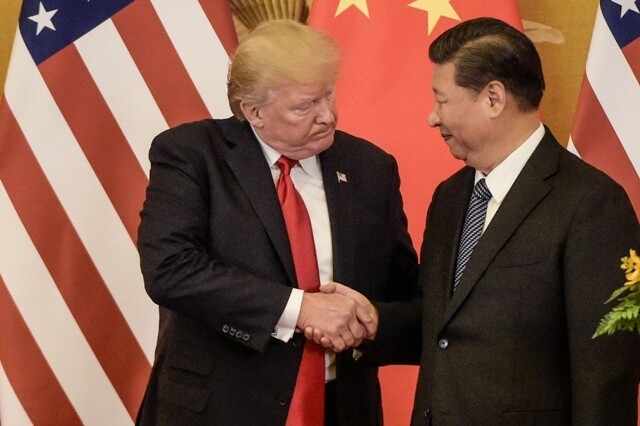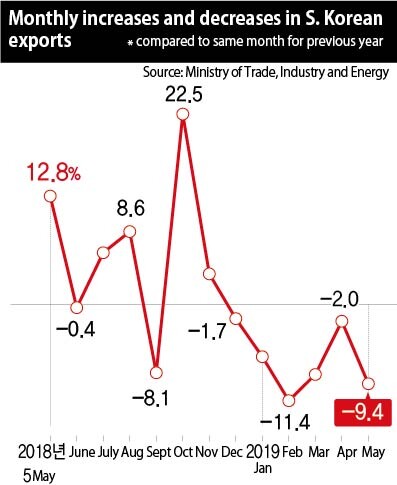hankyoreh
Links to other country sites 다른 나라 사이트 링크
[Editorial] US-China trade war is opportunity for S. Korea to reflect on its economic structure

Over the past few days, the US and China have been at each other’s throats, imposing sharp punitive tariffs on the full range of each other’s products. This places a huge burden on the already sluggish South Korean economy, which is heavily dependent upon those two countries. Since their conflict is unlikely to end soon, Korea finds itself in the troubling situation of having to treat this as the new normal.
On June 1, the US raised tariffs on Chinese products arriving in the US from 10% to 25%, as it announced it would do on May 10. The tariffs cover US$200 billion worth of Chinese products, representing nearly all of China’s imports. This dashes the hopes, expressed in some quarters, that the two- or three-week grace period offered at the time of the announcement would lead to progress in the negotiations. On the same day, China retaliated by slapping additional tariffs on US$60 billion worth of US products, with tariffs ranging from 5% to 25%, depending on the product. The two sides are going at it hammer and tongs, unwilling to yield an inch.

Every standoff between the US and China has battered the Korean economy. Korea is a small open economy with close economic links to both countries. Its stock prices and exchange rate are more prone to severe fluctuations than the US, China, or the EU. Korea’s exports, which account for a huge share of the total economy, had already been performing poorly. In May, exports were down 9.4% from the same month last year, and they’ve been declining for six months in a row, since December 2018. For now, we can’t even expect to claim a share of US trade that China will lose.
While we hope that a solution will be found by US President Donald Trump and Chinese President Xi Jinping when they meet in the G20 summit in Osaka this month, it’s too soon to be optimistic. There’s no telling whether they’ll reach an agreement—and even if they do reach a temporary respite, they’ll just be patching over a conflict that could blow up again at any time. The prevailing view is that the two countries’ conflict is not just a trade war, but a hegemonic conflict over technology, intellectual property rights, and the financial market. Given the historical fact that no global hegemonic conflict has ever been concluded through peaceful dialogue, we must conclude that there could be a ceasefire, but no permanent end, to this war.
With Korea trapped between the two sides in this fight, no short-term solutions are in view. All we can do is painfully reflect on the fact that our export-focused economy has been too reliant on a single country. Since there is no easy or immediate solution to this problem, our only choice is to work on gradually relieving the imbalance in our economy. Major companies have already been gradually shifting their production base from China to Vietnam and other parts of Southeast Asia.
Our most urgent business is to reevaluate the methods of overseas risk management applied by the financial system and to make up for their shortcomings. This is also time to focus on strengthening the social safety net and employment for vulnerable groups through expansionary fiscal policy. There’s a critical need for more unemployment benefits and more public jobs for marginalized and vulnerable people who are hit first and the hardest by economic difficulties. Some measures of this sort are included in the supplementary budget that has been submitted to the National Assembly. Given the current weakness not only of exports but also of production, investment, and consumption, we hope that the National Assembly will quickly pass the supplementary budget to enable us to prepare for shocks from overseas and to engineer an economic recovery.
Please direct comments or questions to [english@hani.co.kr]

Editorial・opinion
![[Guest essay] Preventing Korean Peninsula from becoming front line of new cold war [Guest essay] Preventing Korean Peninsula from becoming front line of new cold war](https://flexible.img.hani.co.kr/flexible/normal/500/300/imgdb/original/2024/0507/7217150679227807.jpg) [Guest essay] Preventing Korean Peninsula from becoming front line of new cold war
[Guest essay] Preventing Korean Peninsula from becoming front line of new cold war![[Column] The state is back — but is it in business? [Column] The state is back — but is it in business?](https://flexible.img.hani.co.kr/flexible/normal/500/300/imgdb/original/2024/0506/8217149564092725.jpg) [Column] The state is back — but is it in business?
[Column] The state is back — but is it in business?- [Column] Life on our Trisolaris
- [Editorial] Penalties for airing allegations against Korea’s first lady endanger free press
- [Editorial] Yoon must halt procurement of SM-3 interceptor missiles
- [Guest essay] Maybe Korea’s rapid population decline is an opportunity, not a crisis
- [Column] Can Yoon steer diplomacy with Russia, China back on track?
- [Column] Season 2 of special prosecutor probe may be coming to Korea soon
- [Column] Park Geun-hye déjà vu in Yoon Suk-yeol
- [Editorial] New weight of N. Korea’s nuclear threats makes dialogue all the more urgent
Most viewed articles
- 1Behind-the-times gender change regulations leave trans Koreans in the lurch
- 2South Korean ambassador attends Putin’s inauguration as US and others boycott
- 3Family that exposed military cover-up of loved one’s death reflect on Marine’s death
- 4[Guest essay] Preventing Korean Peninsula from becoming front line of new cold war
- 5Yoon’s broken-compass diplomacy is steering Korea into serving US, Japanese interests
- 6Marines who survived flood that killed colleague urge president to OK special counsel probe
- 7Yoon’s revival of civil affairs senior secretary criticized as shield against judicial scrutiny
- 8Japan says its directives were aimed at increasing Line’s security, not pushing Naver buyout
- 91 in 10 marriages in Korea last year was with a foreign national
- 10[Column] The nuclear umbrella and the afterlife